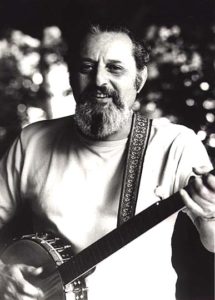Gene Bluestein was an English professor, musician, folklorist, and social activist.

Influenced by the folk music revival, he taught himself to play banjo, performed as a musician, and provided educational programs on folklore and folk music in his classroom, on the stage, and on television. For most of his career, he taught American Studies at California State University, Fresno, where he started and facilitated the Folk Artist in Residence Program. In 1974, while on sabbatical in France, he formed a folk music band with his four children called the Bluestein Family, which performed for over 20 years.
Gene Bluestein Retrospective CD
Books by Gene Bluestein
The Voice of the Folk: Folklore and American Literary Theory
- Publisher: University of Massachusetts Press; First Edition ~1st Printing edition (March 31, 1972)
- ISBN-10: 0870230980, ISBN-13: 978-0870230981
In The Voice of the Folk, Gene Bluestein examines a variety of attempts by writers, critics, and folklorists to define an Amercan folk tradition and to understand its relationship to American life and literature.
The author traces from German philosopher and historian Johann Gotfried von Herder, whose folk ideology became a germinal force in American thought, through Emerson and Whitman to Constance Rourke and the Lomaxes, the notion that folklore is an embodiment of significant cultural values of a nation or ethnic group. Bluestein demonstrates that folklore thereby provides a rich basis from which formal literature can grow.
He applies his these to American culture with particular reference to Miss Rourke’s treatment of the folklore Yankee and backwoodsman, the influence of the “Arkansas Traveler” pattern of frontier storytelling, and the influence of Negro blues and the poetry of “rock.”
Anglish/Yinglish: Yiddish in American Life and Literature
- Publisher: University of Nebraska Press; 2nd edition (September 1, 1998)
- ISBN-10: 0803261470, ISBN-13: 978-0803261471
Writers have celebrated the fruitful dialogue between English and Yiddish for decades. In this engrossing lexicon, Gene Bluestein reveals the full extent of that dialogue, introducing “Anglish, or Anglicized Yiddish, in which a Yiddish word is integrated into English usage, as in ‘shmo’and ‘shmoozing’; and Yinglish, or Yiddishized English, in which an English word is integrated into Yiddish usage, as in ‘allrightnik,’ or the expression ‘a Heifitz he isn’t.’” Bluestein’s insights into and examples of countless Yiddish expressions that have made their way into American English are fascinating and delightful. They vividly remind us of the multiculturalism of the American language and of the nation itself.
The lexicon can be read selectively, like a dictionary, or straight through, as an informative and entertaining romp through a sumptuous linguistic tradition. Everywhere are the words of some of America’s most distinctive voices—Saul Bellow, Cynthia Ozick, Isaac Bashevis Singer, Grace Paley, Philip Roth, Joseph Heller, and countless others. This greatly expanded and updated second edition of Anglish/Yinglish is a splendid guide to the ways Yiddish has permeated and transformed the American language.
Poplore: Folk and Pop in American Culture
Publisher: Univ of Massachusetts Pr; 1ST edition (December 1994)
- ISBN-10: 087023903, ISBN-13: 978-0870239038
- In this innovative study, Gene Bluestein proposes that we revise our ideas about the meaning of folklore in the United States, beginning with our definition of what is “folk” and what is not. To this end, he advances the notion of “poplore” as more accurately reflective of the popular and commercial roots and dynamic, syncretic traditions of American democratic culture. In making his case, Bluestein closely examines the folk ideology of Johann Gottfried Herder, whose theories of nationalism strongly influenced American scholars from Ralph Waldo Emerson and Walt Whitman to Constance Rourke and Alan Lomax. At the same time, he challenges the idea of “fakelore” popularized by Richard M. Dorson and his followers, a concept that assumes unchanging standards of what is genuinely or purely “folk.” To illuminate the significance of “poplore” in contemporary culture, Bluestein shows how Woody Guthrie, Pete Seeger, Jean Ritchie, and other artists have creatively adapted traditional folk materials in their work. The book also includes interviews with legendary banjo picker and singer Buell Kazee and founder of Folkways Records, Moe Asch.
- Tribute Concert for Gene Bluestein (download video)
- Visit Ellie Bluestein page
